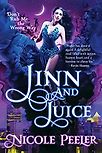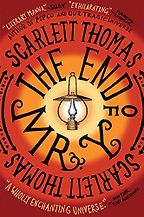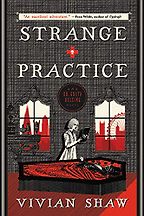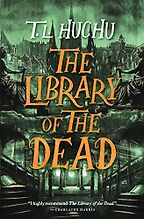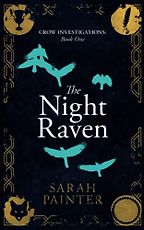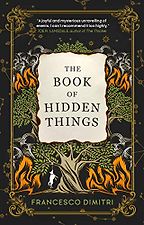Much of what we class as ‘paranormal’ phenomena have commanded true believers over the years, and are disturbing. Are paranormal beliefs still meant to frighten us? What is the appeal of paranormal fantasy books today?
I think what’s interesting about the paranormal is that it has gone in so many directions. But we’ve always found the paranormal alluring. Even with very early vampires – the Varneys and Ruthvens – they’re pretty monstrous, in their depictions, but you could tell they were also supposed to be sexy. So I think there’s always been an allure. I’m really engaged with this idea of the allure of the paranormal, the allure of mystery and death. Death is the ultimate mystery, right? There’s that connection of the paranormal to after-death – ghosts, the undead, some sort of life after death – and just another world: is there more than our lived experience in our little meat-sack bodies?
I think that that is why the paranormal endures as a topic, because it can be so many things to so many different writers and readers. It can represent the ultimate horror, but it can also represent the ultimate fantasy, and it can represent both at the same time. It’s an interesting liminal space, which I think is very attractive as a thought experiment.
Tell us about your first paranormal fantasy book recommendation: Scarlett Thomas’s The End of Mr. Y.
I read this book years and years ago, when I was living in the UK, and I was just floored by it: it’s beautiful. It’s lyrical, it’s dense, and it captures a state of ennui that was very much part of my own life at that stage as a young graduate student. I taught Matt Haig’s The Midnight Library this year in one of my online courses for the MFA, and one of the things I kept thinking about is how The End of Mr. Y is the more literary and far more cynical version of The Midnight Library.
It’s a really gorgeous book. It has this fantastical element – it’s not magical realism, there’s definitely the element of “this does not take place in our world” – but it’s not often brought up in as a fantasy novel or a paranormal novel. And it absolutely is! I really wanted to put it on people’s radars, because they might not have heard of it, and I think it’s a book that they would really enjoy.
That’s what Five Books is for, so thank you. Could you tell us what it’s about?
It is absolutely bizarre. It’s about a woman who’s a PhD student, and her topic of study is this 19th century writer. She’s been researching him, and she finds an extremely rare copy of his book, The End of Mr. Y. It’s a bit like in Martin Amis’ book The Information, where there’s an author who has a rough draft that no one can get through without migraines, and somebody finally finishes the whole thing and dies. It’s similar: anyone who’s read this book has died. Using the book she brews a potion, and she can actually enter other people’s minds and their thoughts. It’s not a psychic thing: it’s actually entering, and there’s this whole place called the troposphere… It is a bizarre book, but it’s actually very of the now. There have been a lot of recent books written about quantum physics, and it’s got these elements of quantum physics, and of the postmodern novel – it’s very philosophical. Very much asking: “What is the point of living?”
It’s a very dark read, but it’s also weirdly lovely. If you’re wanting a beach read right now, it’s not your choice. If you’re wanting something that is – I don’t want to say morally ambiguous – but not afraid to look at life as something that can’t always be summarised on a bumper sticker, then this is your book.
I know it explores quantum physics and its relationship to the paranormal world. Is scientific understanding changing how we read and write the paranormal?
I’m talking about quantum physics with a PhD in English: I don’t know what I’m talking about! I’ve been reading Cixin Liu’s Three Body Problem – he obviously knows what he’s talking about. But I feel I’ve just been reading a spate of books – I was just watching Loki – where so much of quantum physics has trickled down. I don’t actually know if most of us know what we’re talking about.
There’s so much more science fiction-fantasy. Gideon The Ninth is a great example of that: is it science fiction? Is it? I don’t know! And I love that. It all goes back to Star Wars, which is basically warlocks in space. And there are writers like Ben Aaranovitch, using that Newtonian system to build a scientific magic. A lot of writers like the allure of the genuinely bonkers ideas that are part of quantum physics (and the version they’ve been sold by Marvel!); and also the interesting intersection of science and fantasy. Is it scientific? – I don’t think so, realistically, but it’s fun. It gives some ballast to fantasy. I mean, they’re just really provocative ideas. Who could not be intrigued when they read about quantum physics?
Tell us about your next choice: Strange Practice by Vivian Shaw.
I just absolutely loved this book. I love relatively low stakes, quiet urban fantasy, and I love the spate of books coming out that have that low-key profile – I just finished the sequel (or prequel) to Legends and Lattes, Bookshops and Bonedust. Strange Practice is another great example of that, set in Britain.
Just to drop this in, we recently spoke to Travis Baldree, author of Legends and Lattes, about the best humorous fantasy novels. But tell us more about Strange Practice.
Dr Greta Helsing is a GP for supernaturals. There start to be murders, then she is followed and threatened. I don’t want to give anything away – it’s really easy to slip into spoilers with this book! She ends up being kidnapped and figuring out this string of what look like religious serial killer murders – but in fact, there’s a supernatural reason for them. And she has to be rescued by a band of supernatural misfits, which is part of the fun. It has a nice little romance too. It’s one of the books that I’ve actually read two or three times over the years – I’m not necessarily much of a re-reader of popular fiction, but this is one of the popular fiction books I have returned to, because it’s just such a pleasure.
These misfits are characters that were hugely popular – old stock characters, like vampires Ruthven and Varney – but that didn’t endure like Dracula, partially because they were so self-flagellating and annoying. She plays with that: she doesn’t forget, and suddenly make them sexy. She’s very true to their ridiculous, mellow, dramatic characters.
I don’t know about those vampires.
They were written as serials in papers. They are over-the-top absurd, written a penny a word or whatever, with overly florid descriptions of everything. They both help set that trope of the self-hating vampire: the “I don’t want to be a murderer, but I have to eat,” story; or, “I love this person; I’m going to eat them.” For anyone who’s interested they’re all out there on the internet, free of charge, because they’re hundreds of years old at this point. They were hugely popular.
The paranormal creatures in your Jane True books are also unusual, but all from old legend. Could you tell us a little about how you developed that world?
Honestly, when I wrote the book, I didn’t know what I was doing! I had just finished my PhD and I had time before I graduated and started my new job, and I started writing this fantasy novel; and it was the most self-indulgent experience ever. I just put in everything I would want to read about; it was me just enjoying the genre that I’d love since I was a child, and hadn’t been able to read for years because I was reading serious literature. I was having fun.
The main character Jane is a selkie. Selkies are seal shapeshifters, but the kicker is that they don’t transform like a werewolf; they actually shed their skins. And if their skins are collected, they’re the prisoner of whoever has it. I’ve always been obsessed with selkie mythology – I did a summer college when I was in high school where I took an Irish mythology class and learned about them. They’re liminal characters, caught between two worlds. There’s a lot of misogyny in the myths, depending on the version you hear – oftentimes their skins are stolen by people. So they’re basically these weird trafficked brides. And the Irish knew how to turn the screws in their stories, so they would have children, and it was the children that would find their missing skin. Sometimes the children could go with the selkie for whatever reason, but more often she would get her freedom, and she would have to leave her children. They were bizarrely beautiful stories, but if you take ten minutes to think about it, you realise – this is horrible!
I always really loved those stories, and the way they captured what I’m sure was very much a reality for a lot of women in those societies – that idea of being trapped in patriarchal systems, where your labour as a wife was all-important. So that’s where the selkies came from. And then I just had fun, researching all the bizarre creatures that we’ve invented as part of our global subconscious.
“I’m really engaged with this idea of the allure of the paranormal, the allure of mystery and death”
Selkies are very vulnerable, and part of my intention with Jane True was to create an anti-kickass-heroine – or rather, I wanted her to be kickass in the way that most of the non-supernatural women I know are. They aren’t necessarily martial arts masters, but they still manage to do amazing things. Jane True has a tragic backstory, and a secret: she swims every night in the freezing cold waters off Maine, which should lead to death. Her mother disappeared when she was a young woman, and he was raised by a father who’s loving but poorly. And one night, she discovers a body in the Old Sow, a real whirlpool right off Eastport, Maine – and again, something you’re not supposed to swim in. She brings the body to the shore, and that means she’s embroiled in a supernatural mystery. And she learns about her secret heritage: her mother was a selkie, so she’s a halfling. And there’s something running around murdering halflings.
In your third choice we return to more mainstream paranormal creatures – ghosts. Could you introduce The Library of the Dead, by T. L. Huchu?
This book is such fun! I’ve been teaching it in a couple of my classes. It’s really a young adult book, but – I don’t know how to say this without sounding rude – it’s not annoying! It doesn’t have that character-always-making-the-worst-decision-possible vibe. The character’s a youth, and they do silly things, but it makes sense. It’s set in a kind of a post-apocalyptic Edinburgh, which is so much fun. That’s where I did my PhD – so it was lovely to see all my old haunts, steadily crumbling.
There’s a young girl who’s a ghost whisperer. This is her job: she can get ghosts to talk to her, so she takes messages to their families, and the families can get the message for a certain amount of money. So it’s a little scammy, but it is legit, she does actually talk to these ghosts. She’s from a very low class in this world – there are still the classic class stratifications of the UK, but it’s greatly exacerbated because of this post-apocalyptic world. She’s from the absolute slums. But she ends up becoming the mentee of this very famous magician, who’s part of the aristocracy of magic. Shenanigans ensue.
Again, we’re investigating something. Most of these have a mystery subplot. And this one is just so much fun! It’s post-apocalyptic, but the focus isn’t survival – it’s not the kind of post-apocalyptic novel where they’re figuring out how to get water. It reminds me a little bit of a far less bleak Parable of the Sower, because it’s a recent post-apocalyptic scenario. It feels like a commentary on where we could easily go, minus the fantasy stuff.
Ghosts still command more belief than the other paranormal creatures we’ve discussed. Does that change how we read them?
You know, I’m always surprised. I’m very sceptical about the existence of ghosts, especially after having lived in somewhere like Edinburgh. If you don’t run into a ghost in the Grassmarket, where literally hundreds of women were burned to death, is your suburban house really going to be full of ghosts? Is that really what would happen? So, I am sceptical about the paranormal – and I’m always surprised at how that scepticism is not echoed by others.
I think ultimately people just want to understand what happens when we die, and think that there will be contact with their loved ones afterwards. It’s a seductive idea to explore, so it’s going to endure. I think something like the vampire or the werewolf, which is equally seductive, is almost too scientific now – the more we explore them, the more we make up possible reasons why they exist and come down to viruses or genetics. They lose their mystery. They’re still sexy and fun, but they’re not as baffling and frightening as they once were. Whereas we still don’t know what happens with death, and the purpose of it, and whether there is life after death. I think that might be part of it.
Private investigators appear again in The Night Raven, by Sarah Painter. Could you introduce us to your next paranormal fantasy book recommendation?
I love this book. I believe Painter’s Crow Investigations series is self-published, and it’s such a fun series: classic urban fantasy with a kick-ass heroine. I always have the next one pre-ordered, and I’m so happy when it comes out into my Kindle.
It’s about a woman who’s a private investigator, and trying to be on the straight and narrow, but she’s from this very mafia-esque supernatural family. They are part of the Crow family – and I love everything crow, I’m one of those sad nerds that just secretly wants to befriend the crows. There are three other families, and they’ve carved up London. They have the characteristic of their names, so the Crow family have powers of deception – very good at sleight of hand, can tell when people are not telling the truth, that kind of stuff. It’s not super magical, especially at the beginning; magic is an undercurrent. In fact, part of the world-building is that the powers have been waning, and suddenly magic is burgeoning again – and part of the mystery is, why?
Each book has its own mystery at the heart of it. And there’s an overarching series question about this magic reappearing – someone’s clearly stirring something up. So, they’re very satisfying as individual standalone books and very satisfying as a series. I highly recommend.
We’ve had a few mysteries today, and paranormal mysteries seem to be very in vogue – Ben Aaranovitch comes to mind. Why is this so appealing?
I think part of it is that from a craft standpoint, mysteries are just great plots. Mysteries and romances are very clear formats. When I started writing my first book, it fell into the mystery plot, because that’s just very straightforward. With fantasy, science fiction, even horror, anything could happen – unless you’re writing within a specific sub-genre, like epic. So, I think a lot of us look for a plot format to hang our hat on, and mystery is very accessible and fun.
You can have straight mysteries with a human murderer but a supernatural element – ‘paranormal cosies’ – like those written by Juliet Blackwell. The fun of a paranormal element is that it throws everything off. I just watched Death in Venice, the Kenneth Branagh version, and the supernatural element throws a wrench in: Is this really happening? Is it not?
Your final choice opens with more criminal activity in the form of marijuana farming, but then takes a turn for the strange. Could you introduce The Book of Hidden Things by Francesco Dimetri?
Yes! I loved this book. This one might get filed under magical realism. It’s very literary. It’s Italian, and it’s such an Italian book – it makes you want to go to Italy, with all the descriptions of the food. It’s about a group of middle-aged friends in Italy, who have a pact to meet up every year. The guy who insisted on the pact is their leader, and a very charming, strange person – and he doesn’t show up. They think he’s disappeared; they’re not sure what happened to him, and they investigate.
As they do, we get the backstories of these characters, who are all not quite living the lives they thought they would be living. It’s a book about ageing away from the possibility of youth, and into the reality of middle age – but then there’s a backdrop of a fairy realm. So, it’s very much about desire and fantasy and reality – in a way that is also at the heart of The End of Mr. Y. It’s nice to bookend with these two: they’re both really about how we endure as humans–how we’re capable of imagining perfect things, and yet have to live imperfect lives.
Interview by Sylvia Bishop
April 23, 2024. Updated: April 24, 2024
Five Books aims to keep its book recommendations and interviews up to date. If you are the interviewee and would like to update your choice of books (or even just what you say about them) please email us at [email protected]
Five Books interviews are expensive to produce. If you've enjoyed this interview, please support us by donating a small amount.

